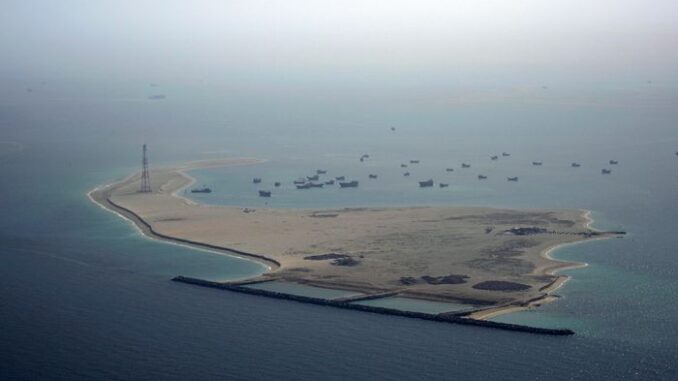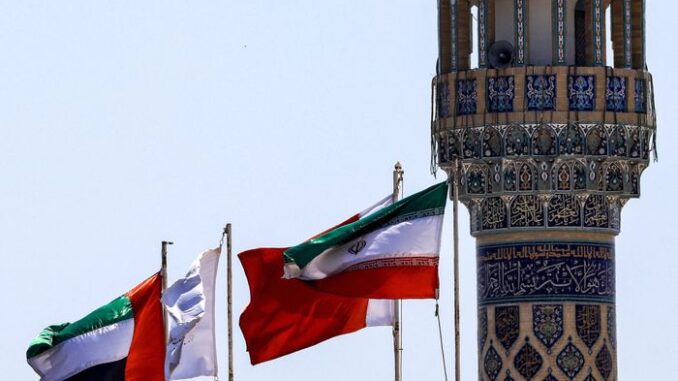T. Belman. I found it interesting that UAE wouldn’t talk to Biden whereas Bibi begs for a meeting in the White House.
The U.S. Navy steps up patrols after complaints from the United Arab Emirates
By Benoit Faucon in Dubai and Dion Nissenbaum, WSJ in Washington

Ships anchored off Dubai. More than a third of the world’s seaborne crude-oil transits come through the Persian Gulf. PHOTO: JON GAMBRELL/ASSOCIATED PRESS
The United Arab Emirates has pressed the U.S. to make more muscular moves to deter Iran after the Islamic Republic’s military seized two oil tankers in the Gulf of Oman in recent weeks, U.S. and Gulf officials said.
The Emirati complaints, expressed to U.S. officials in Abu Dhabi and Washington in recent weeks, mark another moment of disappointment among America’s Middle East partners with security in the Persian Gulf, where more than a third of the world’s seaborne crude-oil transits. Gulf officials say the U.S. has failed to do enough to deter attacks in recent years from Iranian proxies, undermining their faith in Washington’s commitment to the region.
This time, U.S. officials said the Emiratis were frustrated by the lack of an American response to Iran’s seizure of tankers on April 27 and May 3. One tanker was carrying a shipment of Kuwaiti crude oil to Houston for Chevron, while the second was transiting from the Emirati port cities of Dubai to Fujairah.
The U.A.E. was particularly incensed by the seizure of the second vessel leaving Dubai because it could have given the impression its waters were unsafe to navigate, the officials said.
One U.S. official compared the response by the U.A.E. to its angry reaction in January 2022 when the U.S. was slow to come to the Gulf nation’s aid after Iran-backed Houthi militants in Yemen launched a deadly drone attack at the U.A.E. capital that killed three people.

The flags of the U.A.E. and Iran fly above the headquarters of Iran’s consulate in Dubai. PHOTO: KARIM SAHIB/AGENCE FRANCE-PRESSE/GETTY IMAGES
Emirati officials, who compared the 2022 attack to the Sept. 11, 2001, al Qaeda attack on the U.S, were irate that it took Washington two weeks to send a U.S. warship and more jet fighters to the region to support the Gulf nation. U.S. officials have acknowledged that they underestimated the threat that the Emiratis perceived but pointed to the use of American air-defense systems to shoot down Houthi missiles fired at Abu Dhabi as proof of their security commitments.
The U.A.E.’s Sheikh Mohammed bin Zayed al Nahyan, now the nation’s president, was so upset that he later declined a U.S. request to speak to Biden after the attack as Washington tried to assuage Emirati concerns.
U.S. officials said they understand Emirati concerns and have been working with Gulf partners to deter Iran from targeting commercial ships in the region. The U.S. Navy has created a special task force that uses sailing surveillance drones to expand its ability to respond to threats.
“The United States has strong naval ties across the Middle East that enable us to respond to recent Iranian aggression in a collaborative way,” said Commander Tim Hawkins, a spokesman for the U.S. Navy’s Fifth Fleet, based in Bahrain.
After the U.S. said it was stepping up patrols, Rear Adm. Alireza Tangsiri, commander of Iran’s Islamic Revolutionary Guards Corps navy, said Saturday that the U.S. should have no military presence in the Persian Gulf region and the task of securing it belonged exclusively to Iran.
The tanker seizures came nearly two months after Iran and Saudi Arabia reached a deal to restore relations in a move viewed as potentially deescalating tensions between Iran and its Arab neighbors, including the U.A.E., which had made its own overtures to Iran in recent years. But Arab and U.S. officials have said they remain on guard for Iranian threats.
The tensions over the U.S. response to Iran come as the U.S. makes a fresh push on key allies to comply with sanctions on Russia.
In late May, officials from the State Department visited the Gulf state to warn banks and local financial authorities over the risks of handling Russian transactions that could violate sanctions enforced following Moscow’s invasion of Ukraine, the U.S. officials said. The banks responded that most transactions involving Russia were difficult to track because they rely on cash or cryptocurrencies, they said. The U.A.E.’s foreign ministry didn’t return a request for comment.
U.S. officials have also warned the U.A.E. repeatedly against helping Moscow evade sanctions as Russians flock to Dubai to trade oil, buy property and sometimes buy civilian drones that are used in the conflict. The U.S. and European Union have sanctioned Emirati companies that facilitate Russian oil trades and supply Moscow’s industrial base with dual-use military equipment.
Meanwhile, the U.S. has also been increasingly worried by the U.A.E.’s blossoming ties with China.
Works to build a Chinese naval base in Abu Dhabi initially started in 2021 have recently restarted despite Washington’s objections, according to recent U.S. leaks. Growing ties to China have clouded the sale of advanced F-35 jet fighters to the U.A.E., and the U.S. protested the country hiring China’s Huawei Technologies to build out its 5G network.
Write to Benoit Faucon at benoit.faucon@wsj.com and Dion Nissenbaum at dion.nissenbaum@wsj.com



Leave a Reply
You must be logged in to post a comment.